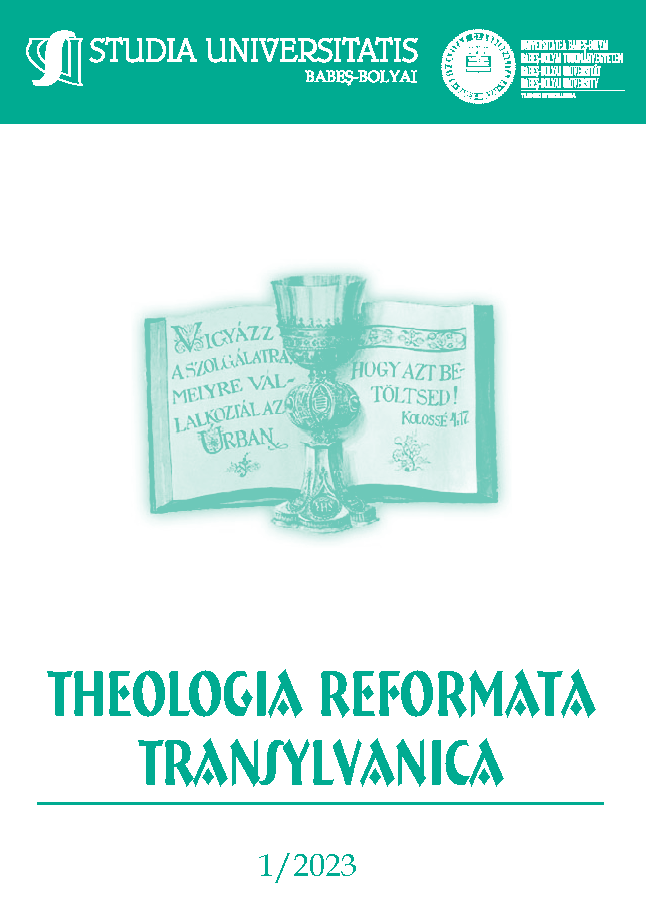A hit fejlődése és a normativitás – keresztyén perspektívából
DOI:
https://doi.org/10.24193/subbtref.68.1.13Keywords:
normativity, James Fowler, faith developmentAbstract
Development of Faith and Normativity – A Christian Perspective. The study deals with the question of normativity: first, in the context of James Fowler’s theory of faith development and later in the sense of the Christian concept of faith. The question we seek to answer is: can we expect in the light of Fowler’s and the Christian understanding of faith that we should grow in our faith? In order to answer this question, we will first consider the meaning of normativity and then examine the normativity of faith development in the context of both the Fowlerian and the Christian interpretations.
References
Arcanum. normatív (szócikk). https://www.arcanum.com/hu/online-kiadvanyok/Lexikonok-a-magyar-nyelv-ertelmezo-szotara-1BE8B/n-40903/normativ-41844/ (utolsó megtekintés dátuma: 2022.12.01.).
BERKHOF, Louis (1976): Systematic Theology. Edinburgh, The Banner of Truth Trust.
BOCK, Darrell L. (2019): Ephesians – An Introduction and Commentary. Downers Grove, IVP Academic.
BULTMANN, Rudolf (2003): Az Újszövetség teológiája. Budapest, Osiris Kiadó.
BYRNE, Peter (1992): The Philosophical and Theological Foundations of Ethics. London, St. Martin’s Press.
CARLSON, Kristofer: What Is “Normative” in Theology?
(https://www.academia.edu/959266/What_is_Normative_in_Theology; utolsó megtekintés dátuma: 2022.12.01.).
CLINEBELL, Howard (1979): Growth Counseling. Nashville, Abingdon.
DREYER, Jaco S. (2004): Theological Normativity: Ideology or Utopia? In: Normativity and Empirical Research. Vol. 10. Leiden – Boston, Brill.
ERICKSON, Millard J. (32013): Christian Theology. Grand Rapids, Baker Academic.
FOULKES, Francis (1981): The Epistle of Paul to the Ephesians. Grand Rapids, William B. Eerdmans Publishing Company.
FOWLER, James (1984): Becoming Adult, Becoming Christian. San Francisco, Harper & Row Publishers.
(1995 [1981]): Stages of Faith. New York, Harper One.
GEISLER, Norman L. (1989): Christian Ethics. Leicester, Apollos.
GREEN, Joel B. – MCKNIGHT, Scot – Marshall, I. Howard (1992): Dictionary of Jesus and the Gospels. Downers Grove: InterVarsity Press.
GRUDEM, Wayne (2000): Systematic Theology. Grand Rapids, Zondervan Academic.
HÄRING, Bernhard Cssr (1997): Krisztus törvénye I. Pannonhalma – Róma, Várszegi Asztrik OSB.
JACOBSEN, Anders-Christian (szerk.) (2009): The Discursive Fight over Religious Texts in Antiquity. Vol I. Langelandsgade, Aarhus University Press.
JENSON, Robert W. (1997): Systematic Theology Volume 1: The Trinue God. Oxford – New York, Oxford Univeristy Press.
LEON-DUFOUR, Xavier (1986): Biblikus teológiai szótár. Budapest, Szent István Társulat.
PANNENBERG, Wolfhart (1998): Mi az ember? Budapest, Egyházfórum.
POLLMAN, Karla (2009): Normativity, Ideology, and Reception in Pagan and Christian Antiquity: Some Observations, In: Jacobsen, Anders-Christian (szerk.): The Discursive Fight over Religious Texts in Antiquity. Vol I. Langelandsgade, Aarhus University Press.
RICOEUR, Paul (1986): Lectures on Ideology and Utopia. New York, Columbia University Press.
SCHWEITZER, Friedrich (1999): Vallás és életút. Budapest, Magyarországi Református Egyház Kálvin János Kiadója.
SEBESTYÉN Jenő (1993): Református etika. Budapest – Gödöllő, Iránytű.
SIBA Balázs (2010): Isten és élettörténet. Budapest, Loisir Könyvkiadó.
STREIB, Heinz (1991): Hermeneutics of Metaphor, Symbol and Narrative in Faith Development Theory. Frankfurt am Main, Peter Lang.
VAN DER VEN, Johannes A. (2004): Normativity and Empirical Research. Vol. 10. Leiden – Boston, Brill.
WEBER, Helmuth (2001): Általános erkölcsteológia. Budapest, Szent István Társulat.
WULFF, David M. (1993): On the Origins and Goals of Religious Development, In: The International Journal for the Psychology of Religion. 1993/3. Lawrence Erlbaum Associates Inc.
Downloads
Published
How to Cite
Issue
Section
License
Copyright (c) 2023 Studia Universitatis Babeș-Bolyai Theologia Reformata Transylvanica

This work is licensed under a Creative Commons Attribution-NonCommercial-NoDerivatives 4.0 International License.






